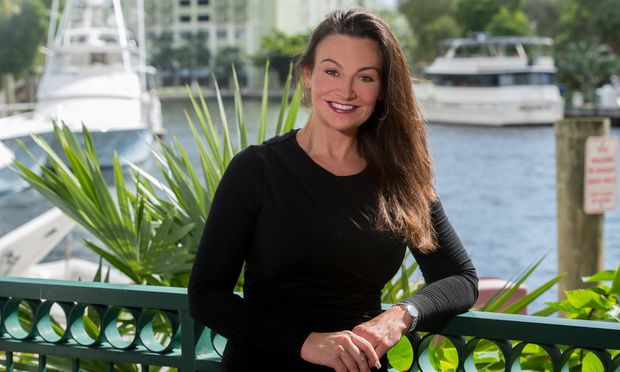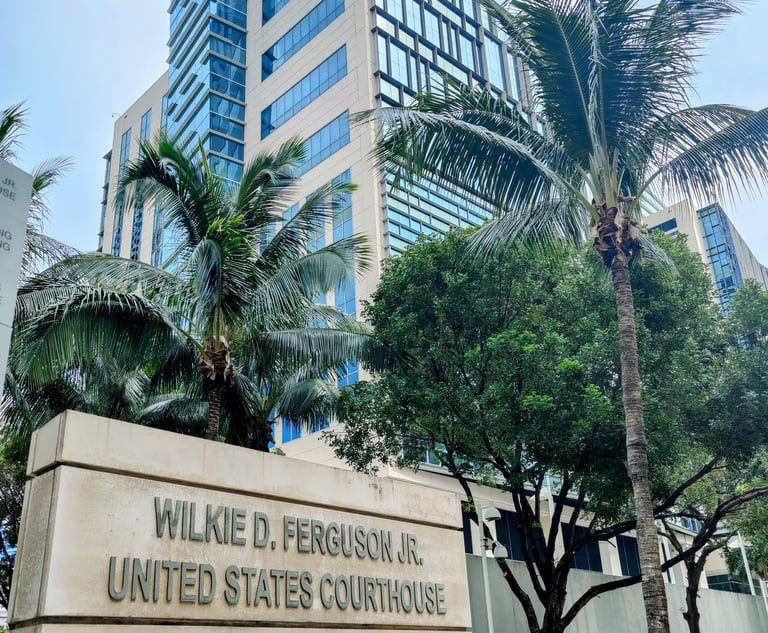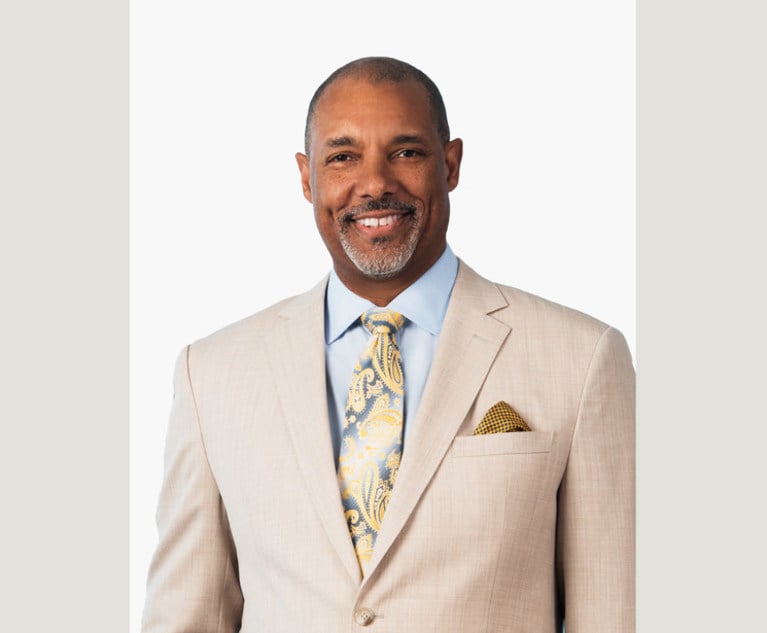Agriculture Candidates Want Federal Changes on Pot Banking
But Democratic agriculture-commissioner candidate Nikki Fried's proposal for a state-created bank to handle the burgeoning medical marijuana industry's money has little support from other candidates who may be part of the next Cabinet.
September 18, 2018 at 12:32 PM
6 minute read
 Nicole “Nikki” Fried/photo by Michael Murphy
Nicole “Nikki” Fried/photo by Michael Murphy
Democratic agriculture-commissioner candidate Nikki Fried and other state Cabinet candidates from both parties want to see federal banking changes that could lead to Florida financial institutions being open to people and businesses with ties to the medical-marijuana industry.
But Fried's proposal for a state-created bank to handle the burgeoning industry's money has little support from other candidates who may be part of the next Cabinet.
Fried, an attorney and medical-marijuana lobbyist from Fort Lauderdale, has made revamping regulations about the cannabis industry and banking a high-profile issue because of difficulties she has had in securing a bank for her campaign account.
Fried said as a Cabinet member she would lobby the federal government to enact laws that would protect banks that handle money tied to marijuana. She also would advocate that the state's top financial regulator, who is overseen by the Cabinet, maintain an “open door” policy for banks handling marijuana money. Also, she said she would urge fellow Cabinet members to charter a bank that could handle the money.
“We can start a state bank. That is something I have been proposing as well, a national state-bank that is controlled by the Cabinet that we can take dollars from companies and have it housed in one location,” Fried said during a conference call last week in which she was joined by former Gov. and Rep. Charlie Crist.
Fried said a state-backed bank would be better positioned for Florida lawmakers to provide defense from “any actions on the federal level.”
Fried's call came as twice in the past two months has her campaign account been bumped from national banks, first by Wells Fargo, then by BB&T.
Florida voters in 2016 approved a constitutional amendment that broadly legalized medical marijuana. While Florida is one of about 30 states with such legalization, cannabis remains illegal on the federal level. As a result, financial institutions have been reluctant to put themselves into a position where they can be accused of laundering drug money.
“These banks are placing limits on access to medical marijuana and limits on the care Floridians can receive,” Fried argued.
Fried's Republican opponent for agriculture commissioner, state Rep. Matt Caldwell of North Fort Myers, has a different plan to address medical-marijuana issues.
Caldwell wants to move the Office of Medical Marijuana Use from the Florida Department of Health to the Department of Agriculture and Consumer Services. The winner of the Caldwell-Fried race in November will head the Department of Agriculture and Consumer Services for the next four years.
“I am advocating for the largest role possible for the commissioner in order to see the medical cannabis program instituted and developed consistent with the law and Florida Constitution,” Caldwell said.
Asked about the state establishing a bank to handle the interests of businesses tied to medical marijuana, Caldwell said businesses have been using state-chartered banks “to solve this challenge in the free market.” Private banks can be state chartered or federally chartered.
Caldwell also said he would continue to support a proposal by Rep. Matt Gaetz, a Republican from Fort Walton Beach, that would “down-schedule cannabis,” which is now considered by the federal government like heroin and cocaine.
“This would also ease the challenges for outside industries, such as banking,” Caldwell said.
Democrat Jeremy Ring, a former state senator running for state chief financial officer, was the only major-party Cabinet candidate who backed Fried in setting up a state-chartered bank to handle medical-marijuana money. However, Ring would place a caveat on how the financial institution is run.
“As long as it serves as a depository institution, solely, then yes, the Cabinet should consider establishing a state-chartered bank,” Ring said. A depository institution could be a commercial bank, while examples of nondepository institutions could include such things as securities firms.
Ring also backed Fried in establishing new rules for the state Office of Financial Regulation to help medical-marijuana businesses.
“Sooner or later, the federal government will have to either change the classification of marijuana, legalize it in some capacity or go after more than half of the nation,” Ring said. “Until that point, I do believe that states do have a role in assisting businesses, particularly here in Florida where over 70 percent of voters backed the legalization of medical marijuana.”
“At the end of the day, elected officials work for the taxpayers and have a responsibility to implement the will of the people,” Ring continued. “With that said, the CFO has a very particular role to play in this in its capacity as part of the [state] Financial Services Commission — specifically the Office of Financial Regulation — which has regulatory oversight of Florida's financial services industry.”
The campaign of incumbent Chief Financial Officer Jimmy Patronis, a Republican from Panama City, said the state has been seeking to clear up federal banking rules.
“The CFO's office sent a letter to the Federal Reserve earlier this year which asked for clarification and guidance on how to best handle the lack of banking options for medical marijuana companies because he was concerned about crimes, theft and the safety of those who are managing the funds associated with those businesses,” Patronis campaign spokeswoman Katie Strickland said in an email.
Attorney-general candidates Ashley Moody, a Republican from Hillsborough County, and Sean Shaw, a Democratic state representative from Tampa, favor working with the federal government to clear up the conflicts in state and federal law.
“The resulting banking issues faced by the medical marijuana industry were known prior to the passage of the amendment and resulting legislation,” Moody said. “The challenges will continue to exist until Congress modifies existing federal law. Unless that happens, there is unlikely anything the state or Cabinet can do to ameliorate these banking issues as even specially chartered banks would still be subject to federal banking regulation and money-laundering laws and reporting requirements.”
She added that Congress needs to codify “a safe harbor to existing banking laws” so the marijuana industry, where legal, can have access to a strictly controlled banking system.
“Continuing to force the industry to operate solely in cash will invite criminal enterprise and jeopardize the safety of employees,” Moody said.
Shaw said he will support the will of the voters but added that the greatest “confusion and instability” is the “federal government's failure to give clear guidance as to how they will enforce federal marijuana laws.”
“It is well past time for the federal government to clear up the inconsistencies between state and federal law and allow the state of Florida to benefit from the same type of new revenue streams that states such as Colorado and California have been afforded,” Shaw said.
Jim Turner reports for the News Service of Florida.
This content has been archived. It is available through our partners, LexisNexis® and Bloomberg Law.
To view this content, please continue to their sites.
Not a Lexis Subscriber?
Subscribe Now
Not a Bloomberg Law Subscriber?
Subscribe Now
NOT FOR REPRINT
© 2025 ALM Global, LLC, All Rights Reserved. Request academic re-use from www.copyright.com. All other uses, submit a request to [email protected]. For more information visit Asset & Logo Licensing.
You Might Like
View All
'Close Our Borders?' Senate Judiciary Committee Examines Economics, Legal Predicate for Mass Deportation Proposal
3 minute read

'Stab Venequip in the Back': Caterpillar Faces $100M Lawsuit in Miami Federal Court
3 minute read
Another Roundup Trial Kicks Off in Missouri. Monsanto Faces 3 Plaintiffs
4 minute readTrending Stories
- 1LexisNexis Announces Public Availability of Personalized AI Assistant Protégé
- 2Some Thoughts on What It Takes to Connect With Millennial Jurors
- 3Artificial Wisdom or Automated Folly? Practical Considerations for Arbitration Practitioners to Address the AI Conundrum
- 4The New Global M&A Kings All Have Something in Common
- 5Big Law Aims to Make DEI Less Divisive in Trump's Second Term
Who Got The Work
J. Brugh Lower of Gibbons has entered an appearance for industrial equipment supplier Devco Corporation in a pending trademark infringement lawsuit. The suit, accusing the defendant of selling knock-off Graco products, was filed Dec. 18 in New Jersey District Court by Rivkin Radler on behalf of Graco Inc. and Graco Minnesota. The case, assigned to U.S. District Judge Zahid N. Quraishi, is 3:24-cv-11294, Graco Inc. et al v. Devco Corporation.
Who Got The Work
Rebecca Maller-Stein and Kent A. Yalowitz of Arnold & Porter Kaye Scholer have entered their appearances for Hanaco Venture Capital and its executives, Lior Prosor and David Frankel, in a pending securities lawsuit. The action, filed on Dec. 24 in New York Southern District Court by Zell, Aron & Co. on behalf of Goldeneye Advisors, accuses the defendants of negligently and fraudulently managing the plaintiff's $1 million investment. The case, assigned to U.S. District Judge Vernon S. Broderick, is 1:24-cv-09918, Goldeneye Advisors, LLC v. Hanaco Venture Capital, Ltd. et al.
Who Got The Work
Attorneys from A&O Shearman has stepped in as defense counsel for Toronto-Dominion Bank and other defendants in a pending securities class action. The suit, filed Dec. 11 in New York Southern District Court by Bleichmar Fonti & Auld, accuses the defendants of concealing the bank's 'pervasive' deficiencies in regards to its compliance with the Bank Secrecy Act and the quality of its anti-money laundering controls. The case, assigned to U.S. District Judge Arun Subramanian, is 1:24-cv-09445, Gonzalez v. The Toronto-Dominion Bank et al.
Who Got The Work
Crown Castle International, a Pennsylvania company providing shared communications infrastructure, has turned to Luke D. Wolf of Gordon Rees Scully Mansukhani to fend off a pending breach-of-contract lawsuit. The court action, filed Nov. 25 in Michigan Eastern District Court by Hooper Hathaway PC on behalf of The Town Residences LLC, accuses Crown Castle of failing to transfer approximately $30,000 in utility payments from T-Mobile in breach of a roof-top lease and assignment agreement. The case, assigned to U.S. District Judge Susan K. Declercq, is 2:24-cv-13131, The Town Residences LLC v. T-Mobile US, Inc. et al.
Who Got The Work
Wilfred P. Coronato and Daniel M. Schwartz of McCarter & English have stepped in as defense counsel to Electrolux Home Products Inc. in a pending product liability lawsuit. The court action, filed Nov. 26 in New York Eastern District Court by Poulos Lopiccolo PC and Nagel Rice LLP on behalf of David Stern, alleges that the defendant's refrigerators’ drawers and shelving repeatedly break and fall apart within months after purchase. The case, assigned to U.S. District Judge Joan M. Azrack, is 2:24-cv-08204, Stern v. Electrolux Home Products, Inc.
Featured Firms
Law Offices of Gary Martin Hays & Associates, P.C.
(470) 294-1674
Law Offices of Mark E. Salomone
(857) 444-6468
Smith & Hassler
(713) 739-1250






